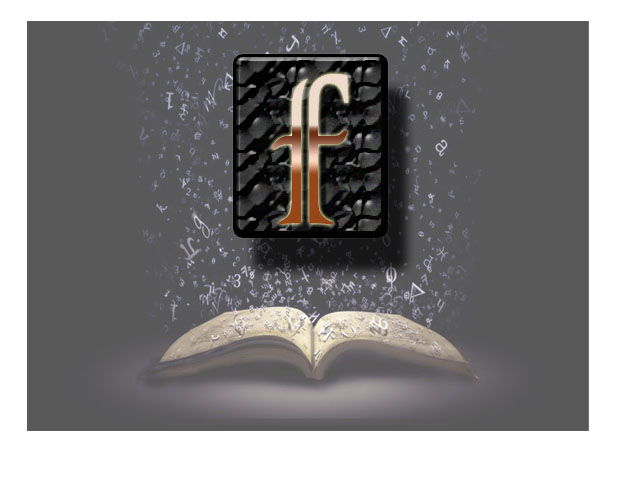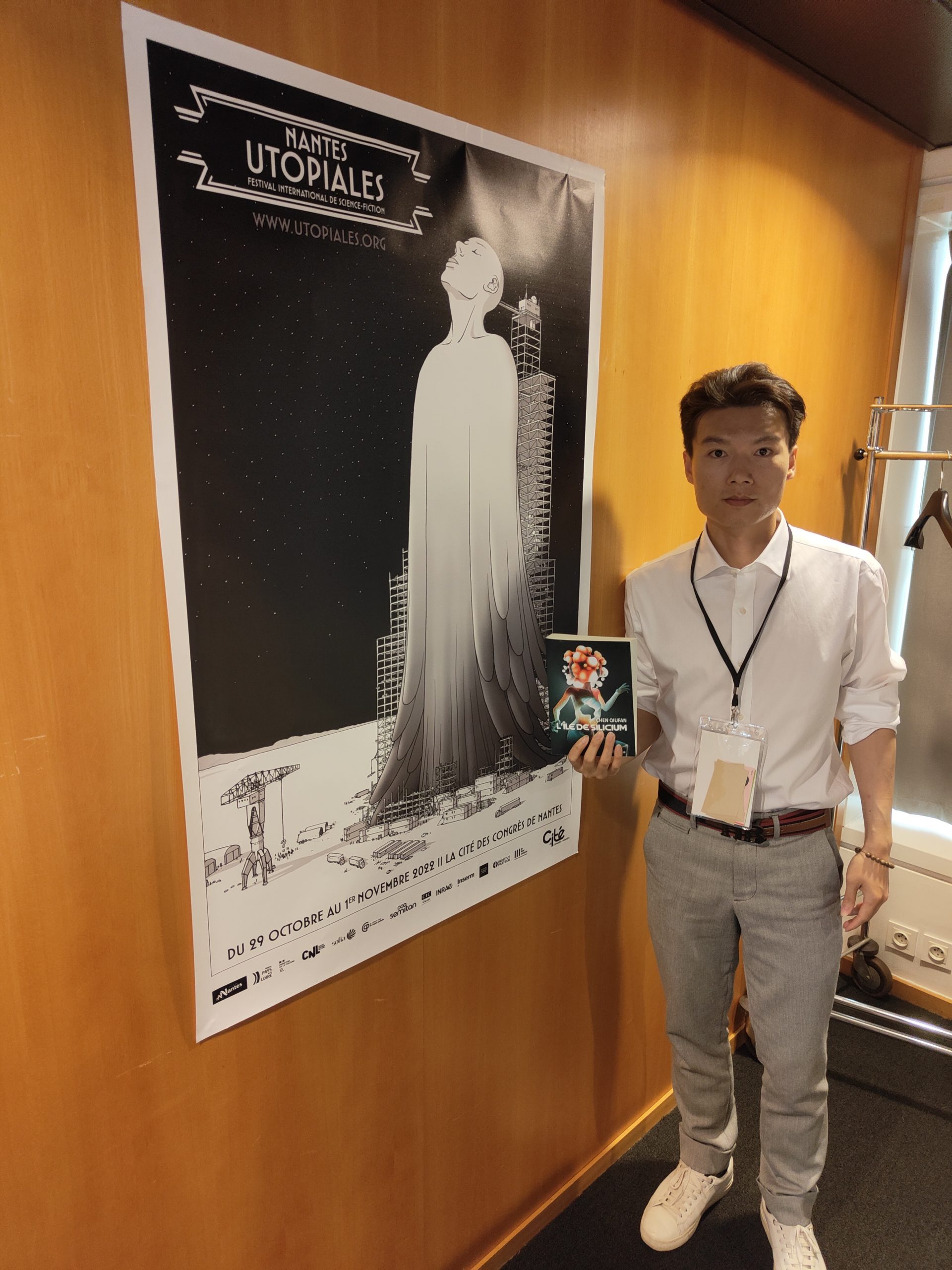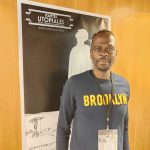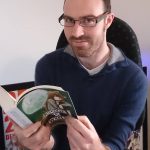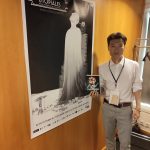During the Utopiales, I have the luck to meet Chen Qiufan and to exchange with him around two actuality: the publication of french version of Waste Tide, which was the first novel published in the new “Imaginaire” collection of Rivages and I.A. 2041, short-stories compilation, published by Les Arènes.
We have discussed around eletronic wastes but not only.
You can find the french version of the interview HERE.
It’s the first novels that you have translated in France. What does it mean for you to be translated worldwide?
I think it means a lot to me because I start to think about how can have my stories be translated into some other languages, like ten or twelve years ago. And because we all know that English is dominant language world widely, like literature, movies or whatsoever, you name it. So it’s really unfair. Especially most people don’t read translation in US or UK. It’s very difficult for foreigners, especially Chinese science fiction writer, if you’re not a Nobel Prize winner. I think it took me quite a few years to figure out how to do it properly. Of course, I met the fantastic translator, Ken Liu. He’s also a best friend of mine, a great writer himself, and also the translator of Three Body Problem. So we know each other for twelve years and I sent him something and he started to translate it for me as a friend’s favor. it starts the whole process, like how Chinese science fiction became widely accessible. And after a while, I think English must come first, then other languages. The publishers, they can read it and they understand what the book is all about and they can follow up with the translation and copyright everything.
So I think it’s a right move. It may be the best decision I ever made to go international. I’m so happy that my book can be translated into French because I think French market is so different. You have the best quality of literature, movie and art. You have very good sense of aesthetics and stylish and everything. It means a lot to me. And of course, like, I met everyone here, they read the book very carefully. They even ask very in-depth questions. And that makes me feel respected as a writer. This is something totally changed my life. I can travel all around the world to meet everyone speaking different language, sharing different culture, but talking about the same science fiction world. This is totally like something dream comes true.
One of the major subjects is around waste treatments and electronic waste treatments. China have received many wastes from all over the world and actually have to deal with the treatment what makes problems. what is the solution about this situation?
I think that happened since nineties, maybe mid or late 90 because that was the beginning of everything like electronic devices were booming in China and all around the world. But when they got retired, you have this trash electronic waste you have to disassemble and recycle it because there are so many rare earth metals in the circuits, chips and other parts. There are also copper, silver, gold and maybe platinum. It’s all precious metal, they can make a lot of money. But it also creates a lot of environmental problems like the acid, the chemistry they use, and also the gas causing the air pollution, and also the soil, water, the physical healthy issue of the workers. The developed countries like US, UK, they don’t want to do it in their own country. They ship all these kinds of things to developing countries like China, Southeast Asia, India, Africa and China definitely one of the biggest recycling centers back in the day. I think now the situation has been changed a lot in China because in 2018, Chinese government launched law to ban 24 types of foreign waste. Including electronic waste and upgrade a lot of places like the location Guiyu I mentioned in the book with much more sustainable technology and more protection to stop polluting the river, the soil and the workers.
Now the situation in China has been changed a lot, but all of these wastes have been shipped to other places like Philippines, like India, like South Africa, because they always need some places to handling all of this electronic waste. The problem will never be solved because we are living in the same planet. I think this problem only can be solved by tracing from the source. It’s how you design the product. You have to think about a lifecycle-sustainability like all these kinds of materials we’re using and how these parts can be easily recycling and tracking and disassembling into, I don’t know, degradable biomaterial. I think this requires a lot of technology, but also law enforcement and mentality from the people to make the change.
One of the points I perceive is a criticism against occident, such as USA who has sent wastes for many years in China and now in Philippines, South Africans and want know to explain you how to deal with your problems? Do you want to share this kind of criticism?
Yes, of course, that’s part of the criticism. But also, I show different perspectives with different characters. Everyone has their justified point of view. For example, the local people, they want to make money, they want to improve their financial status. Of course the government, they try to make progress. And USA, they just don’t want to blow their own backyard. So, they shipped all the shits to other countries. Everyone has their own perspective, they’re all equally legit. But the consequences are we’re damaging the environment, our Earth. Ultimately, we have to admit there’s only one Earth, there’s only one planet we can live in for now. If you try to dump this kind of trash in someone else’s backyard, finally they’ll get back to you. Nobody can escape from it. Just like the movie Don’t look up. I think the problem is not to think about how I can transfer all the bad things, the negative part of the cycle, but to think about how we can put all the efforts together to come up with some new solution with technology or with the systematic design. I think this is more important. But for now, I can see all the geopolitics and ideology differences and boundaries stop us from doing that. I think this is the most depressive, maybe desperate part of humanity.
We are not very aware in France about China. When I read your book, I was very surprise to see a kind of opposition between the China, leader in high technology and in the same time the China with its strong traditional family with belief. Is this still the reality in China?
Yes, I think this is very traditional way of thinking while we’re using all kinds of technologies. Maybe we think it’s something so important that can uplift the society on productivity and efficiency. But still meanwhile, we are still preserving all kind of old-fashioned belief system. Like we worship our ancestor: every month back in my hometown we have this kind of rituals in the ancestral temple. We have all the names, all the small plates for each one of our ancestors and we worship the gods, pray to the Buddha and whatsoever deities. I think this is something almost like quantum physics, like superpositioning: it coexists simultaneously. This is something very unique. Chinese is very pragmatic. They do whatever can be practical in our day life. For example, technology of course can make our life easier and better and believe can make our soul or mentality comforting and coherent. All of those are making the best use of themselves. We have to maintain all of those even it’s totally contradictory in the westerners perspective, but it’s both legit to Chinese people.
And all these things are present in your novel. It makes the story very big, very complex, in a sense. What I see, too, is this opposition between poor people and powered people. In fact, it’s the same everywhere?
Totally. It’s like a metaphor. It could be in China, but could be in France. It could be anywhere on the planet. I think this is why science fiction as a genre is so important, because it’s metaphorical, it’s universal, discussing the issues we are all confronting.
It’s the first novel for the new collection “Imaginaires” of Rivages publisher… but it’s not the only publication you have this month in France today. I.A 2041 has been translated too. Is it a way to answer the fears that you have around the IA, saying that EA are just the tools that we want to make?
Yes. I think artificial intelligence will be the infrastructure just like electricity in the future. It’s totally changing everything we’re experiencing now. It will solve a lot of problems while creating even more problems ethically. For now, A.I. it’s not smart enough to deal with all these kind of bias, discrimination, social construction in the data because basically we’re feeding the machine with data like text and language, natural language. So all these bias, discrimination, social construction is embedded in our language for sure, and the machine learns it and recursively self-enhances it, and it becomes something even worse. For example, the racism and the gender issue will become even more extreme than where we are right now. The Book IA2042 combines science fiction with nonfiction and have the explanation from Dr. Kai-Fu Lee, investor and scientist in the field for many years. He’s making the point that we have to improve the technology, like the algorithm. We need to have more diverse input from different disciplinaries. We need more than engineers: we need humanities, we need anthropologists, we need philosopher and of course artists, like writers, painters, musician and all of those might help us to create a more empathetic AI. It can help us just like looking at the mirror, sometimes you see a very ugly person. And it helps the human beings to improve ourselves, uplift our humanity, and how we can use this tool, this machine, to help us to get over all this inequality, injustice, and lack of sustainability. I think this is what we try to express in the book, IA 2042, is try to help people imagine a better future with technology.
And as you explained, you have written it with Dr. Kai-Fu Lee. Do you consider that, actually, I.A. only make a replication of what we have made and do you imagine through your short stories how we can make the system more in particular like you said, do you imagine something that would make the system more empathic?
Yes. I think more importantly right now what we’re using is just machine learning. It’s very limited and human brain thinks in different way. We need very little energy, we can use small data, not big data sets. We can be trained like babies to learn from one thing to another and build up transferable knowledge and skill sets. But this is not something right now AI can do. We need to know more of what human intelligence really is and AI can help us to understand it and it goes back to help AI to evolve in a more inclusive, diverse and compatible way. Also we need intelligence from the nature because for example, virus has been evolved for 3 billion years on the planet. Maybe you can think it’s not life form, it’s not something with consciousness and intelligence, but actually it is massive distributed intelligence on a certain level. It just keeps evolving in every second and bypass all the vaccination and adapt to whatever people try to avoid it or kill it. It is incredibly smart if you think it in that way. We have to think about all these kinds of different species intelligence and maybe in the future we can merge human intelligence, machine intelligence with nature intelligence like Trinity all together become oneness. This is the whole civilization of planet Earth. Maybe we can call it Gaia. This is something in my next book I’ll write about.
You discuss about Artificial Intelligence, Transhumanism, and more… Does it mean that our future with technology is very important subject for you?
Yes, I can see now because nobody wants to go back to the medieval age like with very poor health conditions, without food and clean water and everything. I think all we can rely on now is the technology, but have to be very careful with the technology because think and see from one single perspective of technology is very dangerous. It always could be put in wrong hands and create even worse scenarios. I think the problem also would be the belief and the consciousness of human beings how we can reflexively improve ourselves as a species, as a civilization. This is something we didn’t make a lot of progress since the caveman age, right? We maybe have a lot of technology to help us to live in a better life. But our brain, our consciousness didn’t really evolve a lot. We still think like our ancestors back in the day. We still want to accumulate so much money and resources, we are so competitive with each other and we are so hostile and fear of the others. I think this is something very deeply rooted in our human nature. But we have to think about how we can get through this, how we can put everyone together as one integral civilization… Because climate change is not for only one country or one class, but it’s for everyone: we have to think out the solution to work universally.
I want to discuss about something that is outside your publication. You have explained earlier that the language can be something that blocks Chinese Science-Fiction to “export”. But what is the place of science fiction in China culture?
Science-Fiction was introduced to China only 100 years ago, so it’s very new, pretty young and it’s from the west. So, people back in the day like the revolutionists, Lu Xian, Liang Qichao, in the Late Qing Dynasty, they tried to introduce science fiction to transform the mentality of the Chinese and also transform the society to a modern country. But they failed. And I think this kind of trying happened in different periods of time in Chinese history. Each time was reflecting a very dramatic dynamic change on the society. For example, after the ten years Cultural Revolution, the bestseller was Science Fiction Utopia about the future China was changed by technology and full of robots, biology farms and all the utopian inventions. In 1978 it became the bestseller. And now I can see the new wave of science fiction uplifting the society, because it’s also come along with the process. When China stepped in 21st century and became part of the globalization. Chinese government considers technological innovation will be crucial for the future competition among different countries. I think they see science fiction as a very powerful tool to educate, to inspire the younger generation for the curiosity and passion about science and technology.
I think right now they can see science fiction also could be some kind of soft power. For example, three body problem. It’s all around the world. And the Wandering Earth, the movie from China making huge box office. Also, this is something the younger generation are familiar with. They are living in a science fiction era full of animation, manga and videogames, that kind of media environment is totally accessible for them to absorbing all kinds of messages. I think right now science fiction in China is becoming a mainstream genre; before it was considered as children’s literature. It was putting aside like totally marginalized genre. But now it was put on the stage, under the spotlight and a lot of papers writing about science fiction, scholars doing researches on science fiction and of course, all different parties, they try to have relationship connected with science fiction because they think this is all about the interpretation right of the future. This is why science fiction becomes something very big right now in China.
Is this the first time in Utopiales? What is your feeling?
It’s amazing. I think this is my favorite festival among many others I’ve been to. I’ve been to festivals and conventions in Japan, Hong Kong, Helsinki, Dublin, a lot of U.S.A. cities of course. I think Nantes will be my favorite because the people are very nice and the venue is incredible creative and I love all this art exhibition, movies and topics. It’s very open, diverse, inclusive.. And it’s very “avant-garde” on a certain level. I think it represents the highest level of imagination all over the world. I definitely would love to be back again in the future.
